Kingston SSDNow V+100 Review
by Anand Lal Shimpi on November 11, 2010 3:05 AM EST- Posted in
- Storage
- SSDs
- Kingston
- SSDNow V+100
Overall System Performance using PCMark Vantage
Next up is PCMark Vantage, another system-wide performance suite. For those of you who aren’t familiar with PCMark Vantage, it ends up being the most real-world-like hard drive test I can come up with. It runs things like application launches, file searches, web browsing, contacts searching, video playback, photo editing and other completely mundane but real-world tasks. I’ve described the benchmark in great detail before but if you’d like to read up on what it does in particular, take a look at Futuremark’s whitepaper on the benchmark; it’s not perfect, but it’s good enough to be a member of a comprehensive storage benchmark suite. Any performance impacts here would most likely be reflected in the real world.
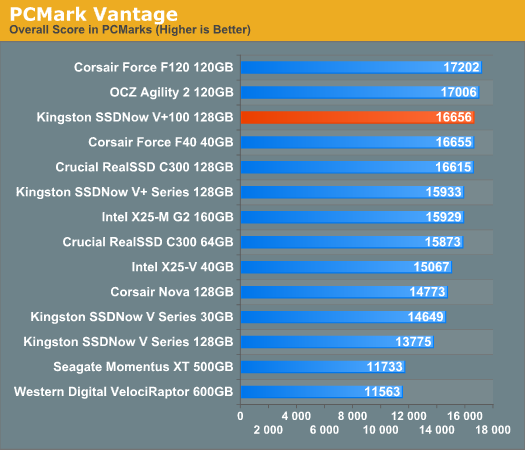
The SSDNow V+100 does very well here. Overall performance is in the top 3, higher than we’ve ever seen Kingston reach. In fact throughout the PCMark Vantage suite you'll see the SSDNow V+100 do very well. In some areas it's the fastest drive of the bunch (by a hair), while in others it's more of an average performer.
The Corsair Force F40 is the highest performing low capacity drive as you'd expect, beating out even the Intel X25-M G2. The 64GB C300 isn't too far behind however.
The memories suite includes a test involving importing pictures into Windows Photo Gallery and editing them, a fairly benign task that easily falls into the category of being very influenced by disk performance.
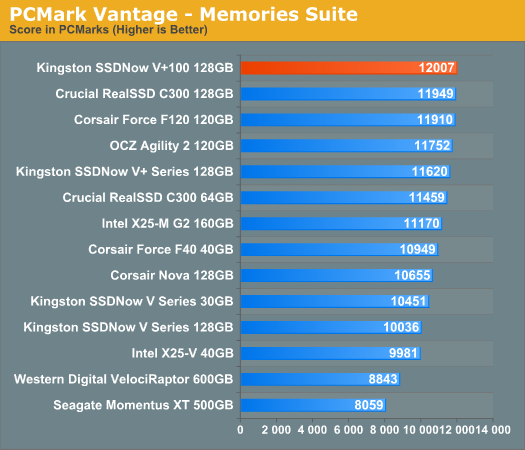
The TV and Movies tests focus on on video transcoding which is mostly CPU bound, but one of the tests involves Windows Media Center which tends to be disk bound.
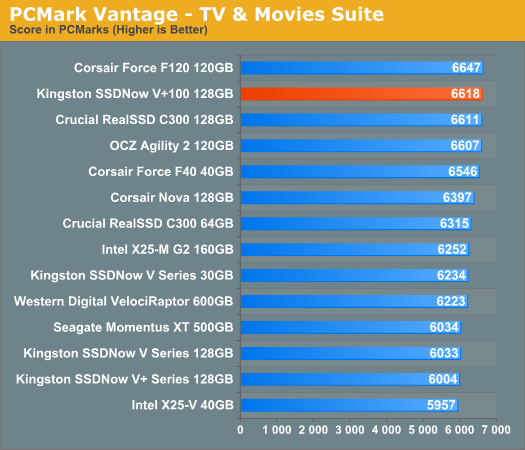
The gaming tests are very well suited to SSDs since they spend a good portion of their time focusing on reading textures and loading level data. All of the SSDs dominate here, but as you'll see later on in my gaming tests the benefits of an SSD really vary depending on the game. Take these results as a best case scenario of what can happen, not the norm.
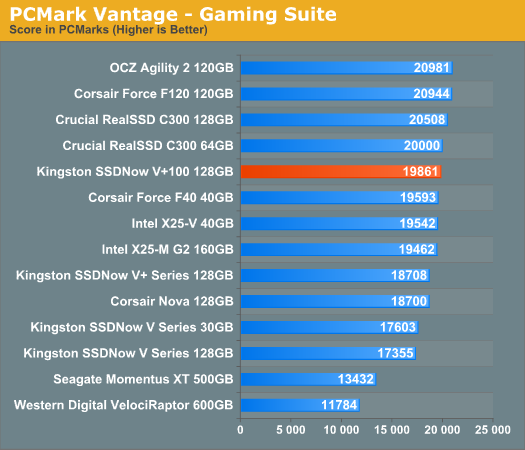
In the Music suite the main test is a multitasking scenario: the test simulates surfing the web in IE7, transcoding an audio file and adding music to Windows Media Player (the most disk intensive portion of the test).
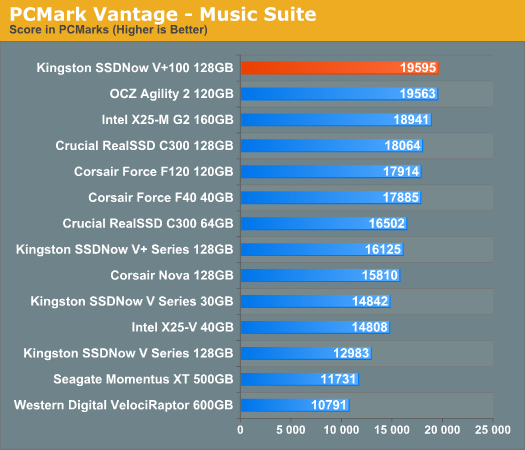
The Communications suite is made up of two tests, both involving light multitasking. The first test simulates data encryption/decryption while running message rules in Windows Mail. The second test simulates web surfing (including opening/closing tabs) in IE7, data decryption and running Windows Defender.
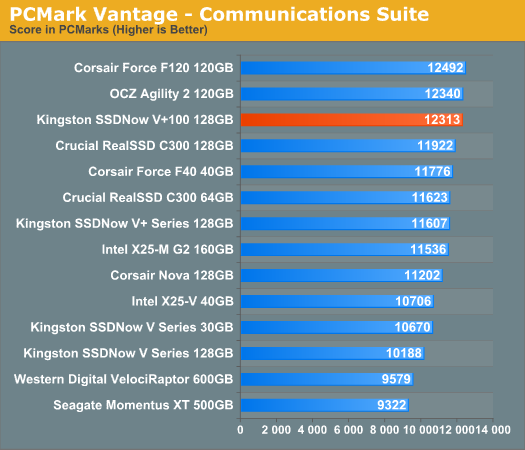
I love PCMark's Productivity test; in this test there are four tasks going on at once, searching through Windows contacts, searching through Windows Mail, browsing multiple webpages in IE7 and loading applications. This is as real world of a scenario as you get and it happens to be representative of one of the most frustrating HDD usage models - trying to do multiple things at once. There's nothing more annoying than trying to launch a simple application while you're doing other things in the background and have the load take forever.
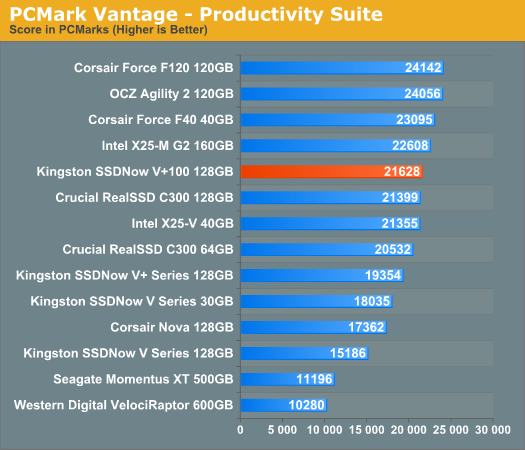
The final PCMark Vantage suite is HDD specific and this is where you'll see the biggest differences between the drives:
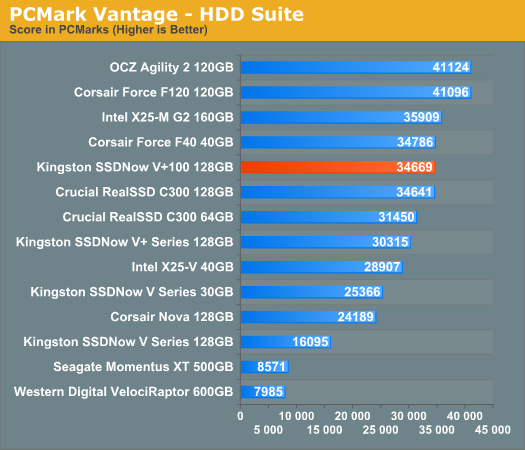
For pure I/O the SSDNow V+100 is good but not the best. Overall performance, as we've seen above looks to be pretty decent however. Let's keep going.










96 Comments
View All Comments
dagamer34 - Saturday, November 13, 2010 - link
If you're buying an SSD, I see no reason why your OS should still be Windows XP.Oxford Guy - Sunday, November 14, 2010 - link
Some may not want to pay the Microsoft tax.Out of Box Experience - Monday, November 15, 2010 - link
What you see is irrelevant to what I use!I see several good reasons to use XP and None to using Windows 7
The number 1 OS is still XP and has the highest user base so why does OCZ think the public will spend an extra $200 for Windows 7 just to use their overhyped SSD's?
Why doesn't OCZ just build SSD's for the majority of people on XP instead of making their customers jusmp though all these hoops just to get synthetic speeds from their drives that have little to do with real world results?
sprockkets - Sunday, November 21, 2010 - link
Oh, I don't know, TRIM support, built in alignment support, build in optimization after running WEI for SSDs?But if you want to stick with a 9 year old OS which lacks basic security, poor desktop video rendering, etc, go right on ahead.
Anand Lal Shimpi - Thursday, November 11, 2010 - link
Representing the true nature of "random" access on the desktop is very difficult to do. Most desktops don't exhibit truly random access, instead what you get is a small file write followed by a table update somewhere else in the LBA space (not sequential, but not random). String a lot of these operations together and you get small writes peppered all over specific areas of the drive. The way we simulate this is running a 100% random sweep of 4KB writes but constraining it to a space of about 8GB of LBAs. This is overkill as well for most users, however what the benchmark does do is give an indication of worst case small file, non-sequential write performance. I agree with you that we need more synthetic tests that are representative of exactly what desktop random write behavior happens to be, however I haven't been able to come across the right combination to deliver just that. Admittedly I've been off chasing phones and other SSD issues as of late (you'll read more about this in the coming weeks) so I haven't been actively looking for a better 4KB test.Now OS X feeling snappier vs. SandForce I can completely agree with. I don't believe this is 100% attributable to the data you see here, Apple also has the ability to go in and tweak its firmwares specifically for its software. I believe the ultra quick response time you see from boot and resume comes from firmware optimizations specific to OS X. Although I am going to toss this Kingston drive in my MBP to see what things look like at that point.
Take care,
Anand
iwodo - Friday, November 12, 2010 - link
ARH, Thx,"toss this Kingston drive in my MBP to see what things look like at that point."
I never thought of that. Keep thinking mSATA was blocking anyone from testing it.
I am looking forward to see your SSD issues and MBP testing.
Tech news has been dull for number of years, SSD finally make thing interesting again.
sunjava04 - Friday, November 12, 2010 - link
hey anand,would you provide a different SSD test result with macbook pro?
like me, many macbook unibody or new mac book pro users use mainly for browsers and office, iphoto, itunes. we like to have ssd to make our experience better and faster. i search many website and blogs, but there are no clear answer for this.
even, apple keeping quite about "TRIM" support!
after, reading your article, i am still not sure which ssd is good for my macbook unibody. i got the an idea of garbage collection which was very helpful. but didn't know, how long ssd last if we use for general purpose?
i really appreciate if you provide descriptive guideline of ssd for OS X.
please, also tell us, is it worth to waiting for intel 3rd gen.?
i desperately need ssd for mac book unibody!
i dont mind to pay premium as long as performance stay as it is! also, i can store movies and other data in external hard drive!
Sincerely,
Rishi
iwodo - Saturday, November 13, 2010 - link
As of Today, i just read another review on SSD comparison. Namely Intel SSD and Sandforce,While the Sandforce wins on all synthetic benchmarks like Seq Read Write and Random Read Write.
It was booting slower, starting up Apps slower, finish task slower then Intel SSD.
And by an noticeable amount of percentage. ( 10 - 30% )
I am beginning to think there are things Sandforce dont work well at all. But again, we have yet to find out what.
Out of Box Experience - Tuesday, November 16, 2010 - link
Sandforce controllers give you the "illusion" of speed by writing less data to flash than contollers without hardware compressionIf I wanted to test the speed of a copy and paste involving 200MB of data in the flash cells of a sandforce based controller, how can I tell exactly how much data is in the flash cells?
I mean, would Windows tell me how much compressed data is represented in the flash cells (200MB), or would Windows tell me how much compressed data is in the cells (maybe only 150MB) ?
The only way I can see fairly comparing an SSD with hardware compression and one without is to be sure you are actually writing the same amount of data to the flash cells (in this case - 200MB)
If sandforce based SSD's will only tell you how much data is represented and not what is actually on the drive, then I think the best way would be to use data that cannot be compressed
The tests I described in another post here involved copying and pasting 200MB of data which took 55 seconds on an ATOM computer with a Vertex 2
200MB / 55 sec = 3.6MB/sec
But if the 200MB was only a representation and the actual amount of data was for example 165MB in flash, then the actual throughput of my Vertex was even worse than I thought (In this case - 165MB / 55sec = 3.0MB/sec)
I need to know exactly how much data is indeed in flash or I need to start using non-compressible data for my tests
Make sense?
Out of Box Experience - Monday, November 15, 2010 - link
There has to be an missing pieces in our performance test, something that these companies knows and we dont.------------------------------------------
Like smoke & Mirrors?
Sandforce Controllers Compress the data to give you the impression of speed
check the speed without compression and then compare drives